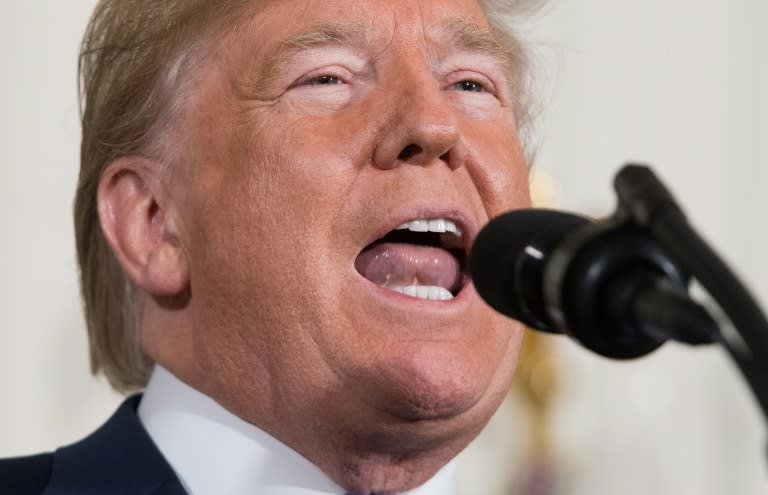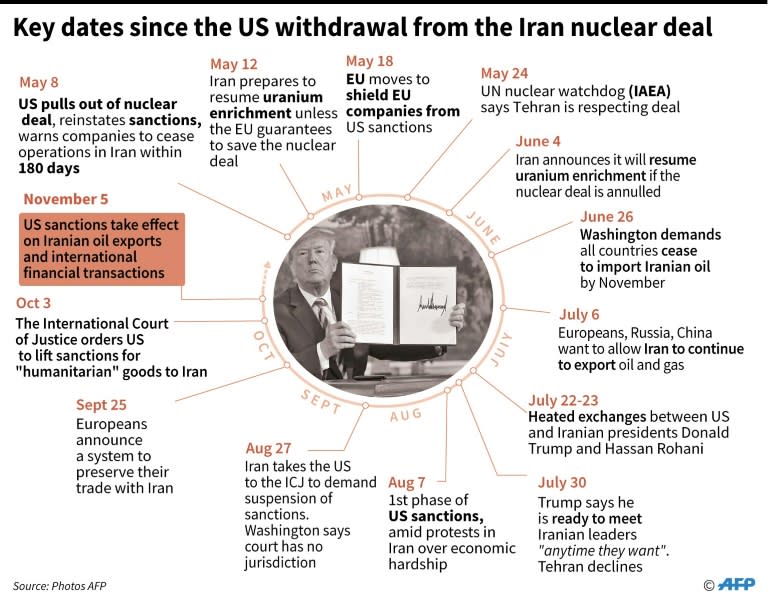Pompeo urges UN to get tough on Iran missiles
US Secretary of State Mike Pompeo on Wednesday urged the United Nations to tighten restrictions on Iran's missiles, which he warned could strike US allies, but other powers called instead for dialogue. Pompeo headed to New York for a Security Council meeting on Iran, which recently confirmed a medium-range ballistic missile test, arguing it is legal and necessary for its defense. "We risk the security of our people if Iran continues stocking up on ballistic missiles," Pompeo told the Security Council. "We risk escalation of conflict in the region if we fail to restore deterrence. And we convey to all other malign actors that they too can defy the Security Council with impunity if we do nothing," he said. Iran has "hundreds of missiles which pose a threat to our partners in the region," Pompeo said, referring to Israel and Arab allies such as Saudi Arabia. Pompeo said the United States would press to preserve a UN arms embargo on Iran due to expire in 2020 and urge the Security Council to set up inspections at sea to prevent weapons shipments. He also called for the return of a firmer prohibition on Iran developing missiles capable of delivering nuclear weapons, toughening language from the Security Council resolution that supported the nuclear deal. President Donald Trump has made pressuring Iran a major focus, withdrawing from an international accord on curbing Tehran's nuclear program negotiated under his predecessor Barack Obama and reimposing sweeping sanctions. Confirming US concerns, a UN report submitted to the Security Council said that recent missiles fired by Yemen's Huthi rebels were manufactured in Iran. Saudi Arabia has been waging air strikes and a blockade against the rebels, who share religious ties with Iran, triggering what the United Nations calls the world's worst humanitarian crisis. - Iran denounces 'lies' - Responding as Pompeo looked on, Iranian envoy Eshagh Al Habib said the top US diplomat was casting Iran as a threat to sell more "beautiful weapons," sarcastically quoting Trump's rationale for backing Saudi Arabia. He said Iran's missiles were not nuclear in nature and defended the need for strong defense, noting that Western powers backed Saddam Hussein as his warplanes destroyed Iranian cities in the 1980-88 Iran-Iraq war. "What we heard today was another series of lies, fabrications, disinformation and deceptive statement by the US," Al Habib said, recalling the "infamous speeches" of top US officials in the past -- a clear reference to Colin Powell's selling of the 2003 invasion of Iraq. "For the first time in the UN history, a permanent member of this Council is blatantly punishing UN members not for violating, rather for complying with, a Security Council resolution," he said. Russian Ambassador Vassily Nebenzia also made a veiled but clear swipe at Pompeo as he denounced attempts to "fan anti-Iranian hysteria." "There is no proof that the ballistic missiles can carry a nuclear load," Nebenzia told the council, adding that Iran "is ready for dialogue." France, while saying it shared US goals on Iran, pleaded for the preservation of the nuclear accord, saying it was verifiably working in freezing Iran's nuclear program. "It's only on this basis that we can build together a long-term strategy for the region," Ambassador Francois Delattre told the council. "Such a strategy can't come down to a policy of pressure and sanctions; it equally has to come with a firm, frank dialogue with the Iranians on our concerns," he said. European powers said they were working to ensure that Iran sees the economic fruits of compliance. But Iran's economy has suffered a severe blow and is forecast to contract due to the renewal of sanctions by the United States, which has vowed to preclude all countries from virtually any business in Iran.


